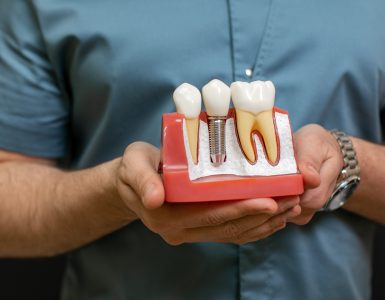You may be suffering the pain and discomfort from sensitive teeth and are wondering why. Some people are more likely to naturally have sensitive teeth than others due to having thinner enamel. The enamel is the tough outer layer of the tooth that protects the dentin and pulp inside the tooth. If this enamel gets worn down, it can expose the next layer inside the tooth, the dentin, which can cause the tooth to become hypersensitive.
So, what can cause the enamel to become worn down?
- The type of toothbrush you use. The tough bristles on a hard toothbrush over time can wear down the enamel on your teeth.
- Brushing your teeth too hard. Likewise brushing your teeth too hard can not only wear down the enamel, but cause your gums to recede thereby causing sections of the tooth to be exposed and unprotected.
- Grinding or clenching your teeth at night.
- Eating or drinking acidic food or beverages. If done regularly this can be one of the main triggers for sensitive teeth.
- Conditions that cause frequent vomiting. Conditions such as gastroesophageal reflux, gastroparesis and bulimia can cause acid to come up from the stomach and oesophagus and may wear down the enamel over time.
Other causes for sensitivity can be:
- Tooth decay, broken or chipped teeth and worn-down fillings or crowns. Any of these can leave the dentin exposed causing sensitivity.
- Whitening your teeth. Sensitivity is a possible side effect after teeth whitening. This is usually caused by the bleaching solution, which can remove minerals in the enamel causing the teeth temporarily to become porous thereby exposing micro tubules in the dentin.
- Dental work. It’s not uncommon for teeth to become temporarily more sensitive following fillings or crowns that leave the dentin in the tooth exposed, or following a dental clean.
Your dentist can examine the health of your teeth to check for any possible causes or potential problems that could cause tooth sensitivity and can guide you through the appropriate treatments.




